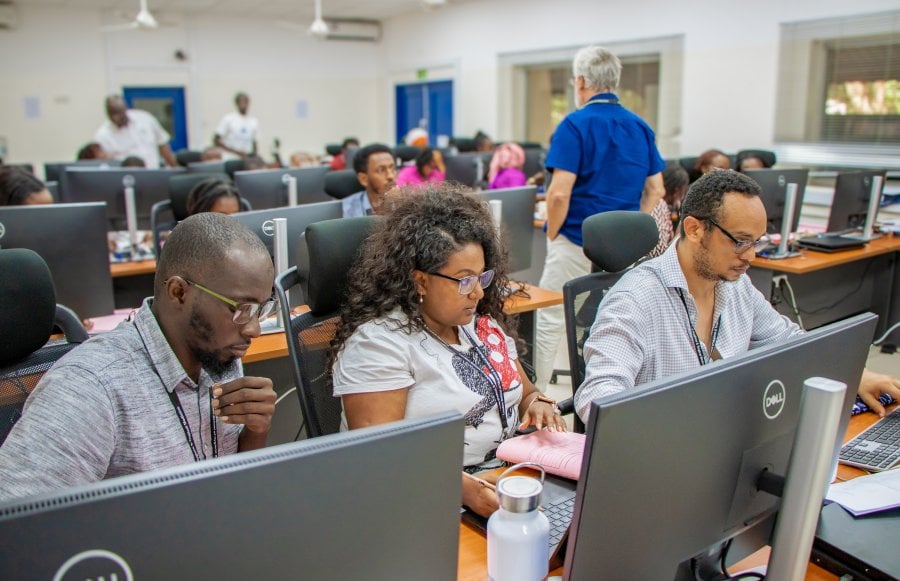
This year around 30 participants from 14 countries in Sub-Saharan Africa were trained. Participants were at different stages of their careers ranging from PhD students, clinicians or research assistants to senior lecturers and mentors. The objective of the course was to improve participants’ ability to design their own studies using appropriate methodology, as well as critically appraise scientific papers and better train and supervise junior researchers at their home institutions.
Angela Steiger, co-coordinator from The London School of Hygiene and Tropical Medicine (LSHTM) provided an overview of the course “The course covered a range of topics over the three-week duration. Participants gained a general understanding of measures of disease and health in populations, as well as the four main types of study design: cross-sectional, cohort, case-control, and intervention. The course also focused on the presentation and summarization of epidemiological data and introduced concepts underlying statistical inference and regression analysis and sample size calculations. It further delved into the types of errors that can occur in epidemiological studies, such as bias, confounding, and chance, and provided methods for addressing these errors”.
Conducting this course at MRCG at LSHTM in The Gambia was a significant step in increasing the accessibility of such trainings to health professionals in Africa. Prof Assan Jaye, Head of Training at MRCG at LSHTM, emphasized “The course is important in equipping health professionals with the necessary skills to design studies using appropriate methodology, critically evaluate scientific papers, and contribute to evidence-based medicine and research. The course aimed to enhance participants' abilities to design their studies, collect and analyze data and make informed decisions in various health research areas including emerging infections, disease preparedness, and responses within Africa, ultimately strengthening the healthcare capacity of the region”.
One of the participants, Terry Wanjala a Kenyan medical laboratory scientist who was able to attend through a scholarship from GlaxoSmithKline (GSK), highlighted the importance of the course in her research area. She emphasized the significance of public health knowledge and its impact on communities stating “By identifying and analyzing risk factors associated with diseases, researchers can design targeted interventions that contribute to reducing disease prevalence and improving community health”.
Another participant Dr Bintou Njai from The Gambia who was one of the scholarship beneficiaries from the West Africa Network of Excellence for Clinical Trials in TB, AIDS, and Malaria (WANETAM), expressed her appreciation for being able to attend the course in Africa “I had access to quality educators and resources without the need for extensive travel. The practical, real-world examples provided during the course related directly to my daily work, leading to enlightening moments throughout the training”.
Pascal Kangberee, a Ghanaian medical doctor specialising in respiratory medicine who joined the course with scholarship support from GSK, emphasized that the course would enhance his practice and enable him to share knowledge with his students as a lecturer.
Participant Dr Olufunmilola Makanjuola from Nigeria, also a GSK scholarship beneficiary, said "The accessibility of the ICEMS course in Africa has been a great opportunity for African researchers. Hosting it at the MRC Unit in The Gambia is ideal due to their recognition for high-quality research.”
Dr Olufunmilola continued “The course has surpassed my expectations, equipping me with confidence in applying statistical methods in epidemiological research, thanks to the superb selection of experts who made the topics relatable and easy to understand. The practical sessions have been intensive yet rewarding, and networking with other African researchers has the potential for impactful collaborations."
Sona Jabang, a scientific research officer working on the Malaria Vaccine Trial at MRCG at LSHTM and an AREF scholarship beneficiary said that the course was an opportunity to evade the layers of barriers to access this fundamental knowledge and was phenomenal. She highlighted “Epidemiological expertise has given me the ability to discover the extent of disease, study the evolution of the disease, assess preventive and therapeutic measures of the disease, and use the data to inform policy. In addition, the statistical expertise gained will help me to analyze, interpret and generate preliminary results. This course helped me to understand and ask relevant scientific questions and approach my work with the necessary knowledge.”
Looking ahead, Prof Umberto D'Alessandro, MRCG at LSHTM Unit Director concluded “The success of this course and the strategic approach to building and nurturing research capacity in Africa will lead to more courses being brought from the London School of Hygiene and Tropical Medicine to MRCG at LSHTM in The Gambia. The aim of expanding our teaching portfolio is to make short courses more accessible to health professionals in Africa and establish MRCG at LSHTM as a training hub for the region. The goal is to provide courses that enhance the capacity of health professionals in addressing emerging infections, disease preparedness, and responses within Africa. This will further strengthen the healthcare and research capacity of the region and help address the specific health challenges faced by African countries”.
The ICEMS course received generous scholarship support from GSK, WANETAM, and AREF. We would like to thank all our funders who have enabled African researchers to take part in ICEMs.
LSHTM's short courses provide opportunities to study specialised topics across a broad range of public and global health fields. From AMR to vaccines, travel medicine to clinical trials, and modelling to malaria, refresh your skills and join one of our short courses today.
